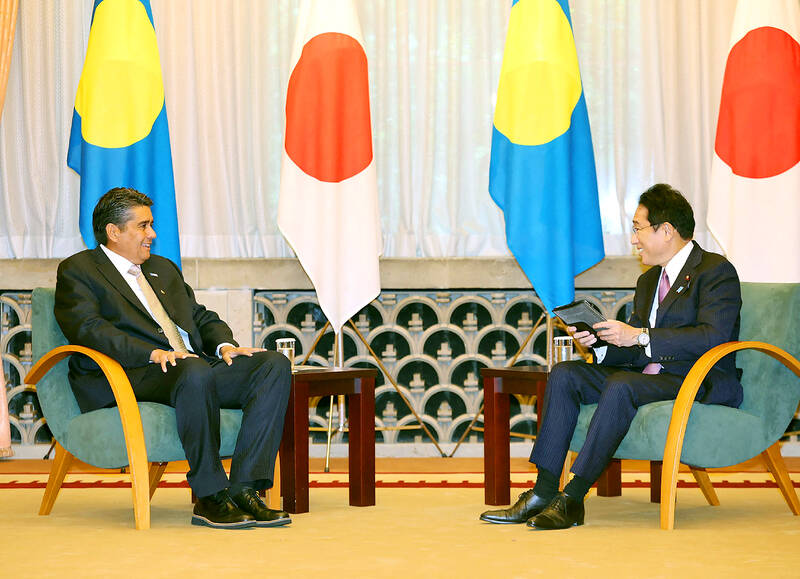Japan and Taiwan’s Pacific ally Palau on Friday spoke of the importance of peace and stability in the Taiwan Strait while reaffirming their opposition to unilateral attempts to change the “status quo” in the Indo-Pacific region.
Palauan President Surangel Whipps Jr and Japanese Prime Minister Fumio Kishida, after meeting in Tokyo, issued a joint statement reaffirming their commitment to “realize a free and open Indo-Pacific.”
Their meeting “emphasized the importance of peace and stability across the Taiwan Strait” as well as the need to maintain freedom of navigation and overflight, the statement said.

Photo: AFP
The leaders expressed concern about the situation in the East and South China seas, it added.
They oppose “any unilateral attempts to change the status quo by force and increase tensions that could undermine regional stability and the rules-based international order,” it said.
All forms of military, economic and political coercion should be opposed, and harmful disinformation countered, the statement said, adding that the two countries would cooperate to respond to economic coercion that aims to achieve “political ends.”
While China is not specifically mentioned in the statement, the comments came as Beijing attmpts to expand its influence over Pacific island nations.
A security agreement China signed with the Solomon Islands, which switched allegiance from Taipei to Beijing in 2019, could have a “significant impact” on Pacific security, Japanese Minister of Foreign Affairs Yoshimasa Hayashi told a news conference during a visit to Palau in May.
The US, Australia and New Zealand have also expressed similar concerns over the security pact that was signed in April.
Whipps arrived in Tokyo on Wednesday for a four-day visit, his first trip to Japan since assuming office in January last year.

NATIONAL SECURITY THREAT: An official said that Guan Guan’s comments had gone beyond the threshold of free speech, as she advocated for the destruction of the ROC China-born media influencer Guan Guan’s (關關) residency permit has been revoked for repeatedly posting pro-China content that threatens national security, the National Immigration Agency said yesterday. Guan Guan has said many controversial things in her videos posted to Douyin (抖音), including “the red flag will soon be painted all over Taiwan” and “Taiwan is an inseparable part of China,” while expressing hope for expedited “reunification.” The agency received multiple reports alleging that Guan Guan had advocated for armed reunification last year. After investigating, the agency last month issued a notice requiring her to appear and account for her actions. Guan Guan appeared as required,

Japan and the Philippines yesterday signed a defense pact that would allow the tax-free provision of ammunition, fuel, food and other necessities when their forces stage joint training to boost deterrence against China’s growing aggression in the region and to bolster their preparation for natural disasters. Japan has faced increasing political, trade and security tensions with China, which was angered by Japanese Prime Minister Sanae Takaichi’s remark that a Chinese attack on Taiwan would be a survival-threatening situation for Japan, triggering a military response. Japan and the Philippines have also had separate territorial conflicts with Beijing in the East and South China

A strong cold air mass is expected to arrive tonight, bringing a change in weather and a drop in temperature, the Central Weather Administration (CWA) said. The coldest time would be early on Thursday morning, with temperatures in some areas dipping as low as 8°C, it said. Daytime highs yesterday were 22°C to 24°C in northern and eastern Taiwan, and about 25°C to 28°C in the central and southern regions, it said. However, nighttime lows would dip to about 15°C to 16°C in central and northern Taiwan as well as the northeast, and 17°C to 19°C elsewhere, it said. Tropical Storm Nokaen, currently

PAPERS, PLEASE: The gang exploited the high value of the passports, selling them at inflated prices to Chinese buyers, who would treat them as ‘invisibility cloaks’ The Yilan District Court has handed four members of a syndicate prison terms ranging from one year and two months to two years and two months for their involvement in a scheme to purchase Taiwanese passports and resell them abroad at a massive markup. A Chinese human smuggling syndicate purchased Taiwanese passports through local criminal networks, exploiting the passports’ visa-free travel privileges to turn a profit of more than 20 times the original price, the court said. Such criminal organizations enable people to impersonate Taiwanese when entering and exiting Taiwan and other countries, undermining social order and the credibility of the nation’s